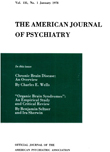INSULIN COMA THERAPY
Abstract
Insulin coma therapy has been used at this hospital since October 1951. Up to June, 1954, 89 patients had received a full course of therapy. A very closely matched group of control patients was obtained, with following conclusions:
1. The insulin coma group showed essentially the same number of improved patients as the control group. Figures for the control group were actually slightly better.
2. The results in the group diagnosed catatonic schizophrenia were much better for the control group than for the insulin treated group. There was no difference in the other diagnostic categories.
3. Where EST was used it was at least as effective as insulin coma therapy.
4. Insulin does not increase the rate of improvement in patients diagnosed either acutely or chronically ill.
5. Although more severely ill patients are given insulin coma therapy, their improvement rate is the same as the control group.
It is our conclusion that the insulin coma therapy has been of little value in itself in the improvement of patients who have had it. We would venture to state that the results we have obtained, which only equal the results of a very similar group not getting insulin, were due to somatic and psychotherapeutic efforts simulataneous with the insulin coma therapy. Psychiatric hospitalization averaged 3 months longer per patient in the insulin group. Our conclusions do not warrant this excess period in the hospital.
Access content
To read the fulltext, please use one of the options below to sign in or purchase access.- Personal login
- Institutional Login
- Sign in via OpenAthens
- Register for access
-
Please login/register if you wish to pair your device and check access availability.
Not a subscriber?
PsychiatryOnline subscription options offer access to the DSM-5 library, books, journals, CME, and patient resources. This all-in-one virtual library provides psychiatrists and mental health professionals with key resources for diagnosis, treatment, research, and professional development.
Need more help? PsychiatryOnline Customer Service may be reached by emailing [email protected] or by calling 800-368-5777 (in the U.S.) or 703-907-7322 (outside the U.S.).



